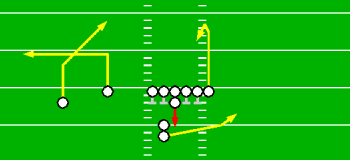Description
If you like the West Coast offense, Hunter may be a good play for you. While not run out of a traditional WCO formation, Hunter is a play based on timing, route running, and precise execution. When throws are made on time and on target receivers will have an excellent chance to make the catch in stride and have a solid run upfield, adding more yards to play. The keys to the play are the complimentary WR crossing routes. These routes can tangle up the coverage, particularly man coverage, and if hit in stride can run for big gains.

Though the crossing routes are really designed to attack man coverage, Hunter is versatile enough that there are viable options in almost all situations. Press coverage may seem ideal for stopping the post, but if the QB can hold the ball and the flanker gets an inside release after breaking the press, the out route will have cleared out the rest of the coverage to open a lot of room for a big catch and run. Zone defenses are a poor matchup for the twin WRs, and the post works well to exploit the overmatched coverage. The swing works well underneath, especially if the DBs start drifting over to the WR heavy side.
Being based off of a fairly standard formation, I Form-Twin Flex brings a lot of nice motion capabilities to Hunter. These options aren't too flashy, but they do provide effective alternatives to the standard play. Depending on how you create your own version of the Twin Flex you may be able to swap the flanker and SE left-to-right, removing the crossing element of the routes but spreading the area of attack and preventing possible WR entanglement. You can also split the TE out wide to provide a clearout for the HB, or move the HB to a right flanker position to get a jump towards the deep sideline (best when the ball starts on the left hash mark).
Player Assignments
| Position | Action |
|---|---|
| O-Line | Pass Block |
| QB | Dropback 2yd |
| Flanker | 5yd Post |
| SE | 5yd Out |
| TE | 8yd Curl |
| FB | Pass Block |
| RB | Swing Right |
See the Madden Playbook Guide for a description of these symbols.
Read Progression
- Flanker post
- SE out
- RB swing
- TE curl
Because this play has West Coast style timing, it uses a simple and direct 1-2-3-4 progression of reads. The quarterback needs to get the ball to the first open WR he sees to really run the play effectively. In some cases this may lead to taking a shorter gain early instead of waiting for the longer routes to develop late, but with Hunter the post route on the first read, while making the break at only 5 yards has the best chance for a big play. Look for this throw immediately after the cut, when the SE out route has just forced the inside coverage to slide to the outside. Watch out for straight up man coverage here, as the flanker has a tendency to get caught up on a DB during the cross with the SE. The out route is the #2 read and should really be made in a single look with the post read. The actual throw however should come a little bit later to allow the SE to run away from the coverage. This route is devastating against man coverage, and can also be effective when the flanker is pressed to the outside if thrown immediately after the break.
Next are the two backup reads, starting with the HB swing. Against man coverage the HB will probably be isolated on a LB, and with good moves a single dodged or broken tackle can create a big play in the wide open spaces on the right side. The final route is the TE curl. This route is most effective when the defense is spread out wide, but may also be a good choice late if the O-line is able to pick up a blitz.
Analysis
Pros:
- Very good YAC potential when executed with good timing
- Quick tempo means O-line not required to sustain long blocks
- Well balanced routes do not require any really outstanding players at any position
Cons:
- Takes a fair amount of practice to get the timing down to realize the play's full potential
- Press or other tight coverage can really disrupt timing for twin WRs, possibly causing them to run into each other
- No blocking help on right side
Contact Arkaein with any comments or questions regarding the Monstrous Madden Playbook.